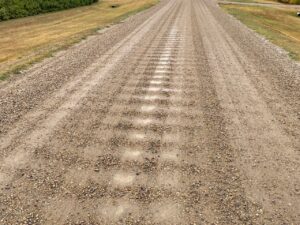What Is Calcium Chloride?
Calcium Chloride is a type of salt, produced by mixing calcium and chlorine. What makes it interesting, is that chemically, it attracts moisture, especially from the surrounding air. When applied to a dusty, gravel road, this dampness prevents the dust particles at the surface of the road from being kicked up when vehicles drive by. It’s a temporary solution that creates a slightly tacky surface, trapping fine particles and preventing them from becoming airborne.
Because calcium chloride works by pulling moisture out of the air—even when the weather is dry, it helps keep the surface slightly damp. It also makes the surface a little sticky, which helps keep loose gravel in place for a short time.
But once it rains or the road is graded, most of it washes away, and you will have to re-treat the road to maintain the suppressant effects.
What Is Calcium Chloride Used For?
On unpaved roads, calcium chloride is sprayed or spread to control dust, particularly during dry seasons. Its moisture-attracting quality keeps the road surface damp, reducing dust and improving visibility and air quality in surrounding areas. This makes it especially popular in rural communities, construction zones, and industrial access roads. It was an affordable and easy way to improve road conditions, especially in rural or industrial areas where paving wasn’t an option.
However, its effectiveness depends heavily on weather conditions. After rain or grading, its impact diminishes, requiring frequent reapplication—often several times per season depending on traffic and climate. It doesn’t bond the gravel or improve the underlying road structure; it simply manages dust for a short window of time.
People used it because:
- It reduced dust quickly and visibly.
- It was readily available and easy to apply.
- It gave temporary relief during dry, dusty seasons.
Despite its early popularity, calcium chloride has clear downsides that make it a short-term fix rather than a long-term solution:
The Drawbacks of Calcium Chloride
While calcium chloride serves its purpose, its limitations are hard to ignore:
- Frequent Reapplication: After rain or routine grading, the material is often washed away or diluted, demanding repeated treatments that drive up long-term costs.
- No Structural Benefit: Calcium chloride doesn’t bind gravel or improve the integrity of the road base. It offers no defense against potholes, wash boarding, or gravel loss.
- Runoff Concerns: The salt can leach into nearby soil and water systems, raising environmental concerns over runoff and long-term site degradation.
- Short-Term Solution: It’s a surface-level fix that doesn’t address the root issues of gravel road wear and tear.
The Bottom Line:
Calcium chloride helped for a while—but with innovative technologies and long-lasting solutions like GRAVELOCK now available, it’s possible that relying on calcium chloride is becoming outdated, expensive, and inefficient. It’s time for a smarter approach to gravel road management
Why GRAVELOCK Is Better – Forus’ Perspective
At Forus, we’ve worked with nearly every dust control method available—including calcium chloride. Through years of hands-on experience, we’ve developed and now trust GRAVELOCK as the superior solution for gravel road stabilization and long-term dust management.
GRAVELOCK Advantages:
- Stabilizes the Entire Road Base: GRAVELOCK doesn’t just treat the surface—it bonds with the gravel to create a stronger, more cohesive road foundation.
- Long-Term Resilience: It resists washouts from rain and freeze-thaw cycles, reducing the need for frequent repairs or reapplications.
- Reduces Grading and Gravel Replacement: By holding the road together, GRAVELOCK minimizes displacement, rutting, and surface erosion.
- Improves Safety: A more stable road means fewer potholes, smoother rides, and better traction.
- Environmentally Smarter: With reduced runoff, no environmental impact and fewer applications needed, GRAVELOCK offers a safer, more sustainable footprint.
- Cost-Effective: Less maintenance, fewer material losses, and longer-lasting roads make it the smarter investment over time.
Watch the GRAVELOCK Explainer Video
Want to see how it works? Check out our video to learn more about the science and strategy behind this next-generation gravel road solution.
Ready to Build Stronger Roads?
If you’re still relying on calcium chloride for dust control, it may be time to consider something better. Contact Forus today to learn how GRAVELOCK can help you build stronger, longer-lasting, and more sustainable roads.




